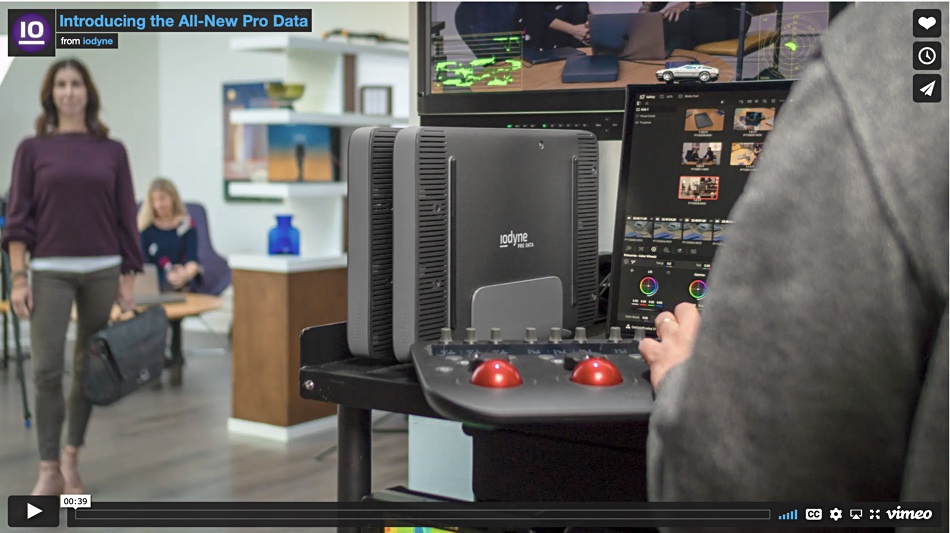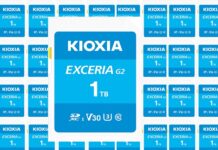…
Broadcom revenues for its fourth fiscal 2021 quarter were $7.4 billion, up 15 per cent year-on year, with $1.99 billion net income compared to $1.32 billion a year ago — a rise of 50.8 per cent. Full year revenues were $27.45 billion, up 15 per cent again, and $6.74 billion of profit — a 150 per cent year-on-year increase. It expects revenues to be in the $7.6 billion area next quarter. The infrastructure vendor pulled in $815 million in server storage connectivity revenue in the quarter, a 21 per cent year-on-year increase due to strong enterprise demand for HBAs and controllers. The earnings call revealed that its nearline storage business has a near billion dollar run rate. It says its next-generation storage connectivity portfolio (SAS 4, PCI Express 5 and NVMe) should help it “accelerate growth in our server storage connectivity revenue in Q1 to approximately 30 per cent year-on-year.”
…
Total Couchbase revenues in its Q3 FY2022 were $30.8 million — up 20 per cent year-on-year. There was a loss of $15.9 million, deeper than the year-ago $10.15 million loss. Annual recurring revenue (ARR) was $122.3 million, an increase of 21 per cent year-over-year. It expects revenue between $33.9 million and $34.1 million next quarter. Matt Cain, president and CEO of Couchbase, said: “Our strong third quarter performance was driven by ongoing large deal momentum, including some significant expansions, as well as acceleration of our cloud business. We also delivered solid top line growth … We continue to see demand for our modern database as digital transformation remains a priority across industries, and are excited about the market opportunity for Capella which makes it faster and easier to consume Couchbase in the cloud.”
…
Cloud backup provider Datto hosted an investor day. Jason Ader, a William Blair analyst, reported: “Datto sees potential for reacceleration to sustainable 20 per cent revenue growth and is targeting $1 billion-plus in revenue by full year 2024. With the core backup/recovery (Continuity) business growing steadily in the midteens (and representing 60 per cent of subscription revenue), the main growth engine is expected to come from user-based offerings, which include SaaS Protection, RMM, and security. This segment, which is growing today in the low-40 per cent range, should account for an increasing mix of Datto’s revenue over time.”
…
Digistor is rolling out commercial-class PCIe 4 NVMe SSDs in the M.2 form factor with 500GB to 4TB capacities. They have upto 7.2GB/sec read and 6.85GB/sec write bandwidth. Non-encrypted commercial PCIe 4 SSDs are available now with self-encrypting TCG Opal 2.0 versions available in Q1 2022.
…
Exascend, a provider of industrial, enterprise and cinematography storage, announces its P14 series of PCIe 4 NVMe SSDs available in the M.2, U.2 and E1.S form factors with Kioxia and Micron 3D TLC NAND. It says the PI4 series features ultra-high capacity (960GB to 7.68TB), and best-in-class energy efficiency. They deliver sustained transfer speeds of up to 3.5GB/sec and 4K random speeds of up to 600,000 IOPS. They come in M.2 2280 and U.2 form factors and can operate in temperatures from -40 to 185°F (-40 to 85°C). Exascend suggests they are a good fit for applications in the rugged edge servers, autonomous driving systems, surveillance, and big data logging systems areas.
…
IDC has issued a semi-annual Software-Defined Infrastructure Tracker that, no doubt, contains interesting supplier/product level detail information in its three categories: software-defined compute (54 per cent of total market value), storage controller software, and networking software. IDC actually uses the terms software-defined storage controller software (35 per cent of total market value), and software-defined network virtualization and SDN controller software (10 per cent of total market value), which seem excessively and redundantly wordy. Whatever, the publicly released information is frustratingly top-level and not really informative — the worldwide SDI market reached $6.5 billion during the first half of 2021, which was a 10.7 per cent increase year-on-year. Well, golly gee.
…
Mike Shapiro and Jeff Bonwick of DSSD and Sun/Oracle are involved in a startup called Iodyne which is building a consumer storage product packed with NVMe technology. They have just announced a ProData SSD product featuring eight Thunderbolt ports and 12x NVME SSDs (totalling 12 or 24TB) outputting 5GB/sec. They say: “Pro Data is the fastest Thunderbolt storage for M1 Macs, and the fastest Thunderbolt RAID array.” You can daisy-chain up to six Pro Data devices per host port for up to a whopping 576TB of solid-state awesomeness. See the video below for more info.

…
NAS supplier iXsystems has appointed ex-DDN Tintri CMO Mario Blandini as its VP of Marketing. He’s previously worked at DZSi, SwiftStack (acquired by Nvidia), Drobo, Brocade, Rhapsody Networks, and SANrise. Blandini will support the adoption of TrueNAS storage as iXsystems expands deployments in SMB and enterprise IT environments.
…
MongoDB revenues in its Q3 FY2021, ending October 31, were $226.9 million, up 50 per cent year-on-year. Subscription revenue was $217.9 million, an increase of 51 per cent year-over-year, and services revenue was $9.0 million, an increase of 35 per cent year-over-year. There was a net loss of $81.3 million, slightly worse than the year-ago loss of $72.7 million. It expects Q4 revenues to between $239 million and $242 million. William Blair analyst Jason Ader said these numbers were “blow-out results and guidance.” He said: “Top-line growth of 51 per cent was the fastest growth in over two years, with both Enterprise Archive and Atlas seeing year-over-year acceleration (EA up 19 per cent and Atlas up 85 per cent, its fourth consecutive quarter of accelerating growth).” He added: “large enterprises are now standardising on MongoDB for an increasing number of workloads and viewing the company as a long-term strategic partner.”
…
A NetApp Future is Hybrid survey looked at 83 global customers representing organisations across multiple industries that have deployed hybrid cloud architectures. It found 77 per cent of respondents indicate they plan to operate as a hybrid cloud for the foreseeable future. A majority believe the hybrid cloud model improves infrastructure flexibility and scale. A majority also use hybrid cloud for protection of their data. They start either by moving secondary storage to the cloud for use cases such as data protection or by moving less business-critical workloads such as application development and DevOps to the cloud. They then move on to more critical workloads. A majority also thought hybrid cloud flexibility enables them to innovate faster.
…
Oracle’s Q2 FY2022 revenues were $10.4 billion, up 6 per cent year-on-year. Total Cloud Revenue (IaaS plus SaaS) was up 22 per cent to $2.7 billion. Cloud services and license support revenues were up 6 per cent to $7.6 billion. Cloud license and on-premise license revenues were up 13 per cent to $1.2 billion. But Oracle’s Q2 GAAP results were adversely impacted by the payment of a judgment related to a ten-year-old dispute surrounding former CEO Mark Hurd’s employment. There was a loss of $1.26 billion compared to a profit of $2.44 billion a year ago.
William Blair analyst Jason Ader mentioned: “longer-term competitive positioning concerns. For example, despite the early success of Oracle’s highly touted autonomous database, Oracle remains a database market share donor (7 points of share loss between 2018 and 2020, according to IDC, with continued share loss expected in 2021). Moreover, while OCI is experiencing strong growth, Oracle remains far behind the big three vendors in terms of IaaS market share and the feature richness of its cloud services portfolio.”
…
Dario Zamarian is on the hiring trail as Pavilion Data has hired Anil Virmani as its SVP for software engineering. Previously he was VP engineering and product management, GreenLake Cloud Services at HPE, and stints at ADARA, VMware, and Juniper Networks before that. Chethan Bachamada is appointed as Pavilion’s VP of operations, leaving Jabil as a business unit director after a 20-year-plus period at the company. It’s also appointed Lynn Orlando as its VP narketing. She comes from being head of content marketing at WekaIO, and head of marketing at Stellus before that.

…
The SNIA has formed a Zoned Storage technical workgroup and the charter members are Western Digital, Samsung, NetApp, and Microsoft. It says command interfaces for Zoned Storage have been standardised (ZAC/ZBC for SMR HDDs and ZNS for NVMe SSDs), but the specs leave flexibility in how host software interacts with the Zoned Storage IO stack and Zoned Storage devices, resulting in different application best practices depending on the use case. The Zoned Storage ecosystem will benefit from the description of common use cases, and a nomenclature around which corresponding host/device models can be described. The new workgroup will facilitate a common industry understanding of Zoned Storage use cases and create a host/device architecture and programming model; providing a framework for Zoned Storage design and enabling the development of a robust Zoned Storage solutions ecosystem.
…
Singapore-based digital travel platform, Agoda, a Booking Holdings subsidiary, selected VAST Data’s all-flash Universal Storage as the data science backbone for its big data and machine learning environment. Agoda supports thousands of users simultaneously searching the website to find the best deals on hotels, flights and other travel reservations. It will build a cost-effective, private cloud computing environment for Apache Spark and Apache Impala processing with real-time access to VAST’s S3-compatible fast object storage.
…








